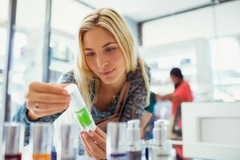Azelis: “Conscious beauty is more than just a buzzword”

21 Nov 2022 --- As consumers become more conscious about what kind of personal care and beauty products they consume and question how they are sourced, companies are propelled to pay more attention to product transparency and its impact on the world. PersonalCareInsights speaks to Azelis to investigate the rise of conscious beauty, delving into the role of social media, beauty trends and the prospects for more efficient and holistic changes.
“Conscious beauty is being mindful of the impact beauty products have on people’s health, the environment and society,” says Jacqueline Hoe, market segment director of personal care at Azelis Asia Pacific.

“For companies, it is an end-to-end holistic approach to product development that starts from ingredient sourcing to the final product launch – including the manufacturing process, formulation composition and origin, and product usage. It also ensures that environmental standards and appropriate social practices are in place at every stage.”
She explains that conscious beauty is affecting the pace of new product launches.
“Before the pandemic, a strong focus was put on short product cycles to keep consumers wanting more. There were many ways for brands to leverage fast production: new colors, new fragrances and special editions aligned with calendar events. But conscious beauty is driving the industry away from fast-moving consumption toward ‘thoughtful consumption.”
“Companies will need to rethink how we consume beauty products. Take waterless formulations, for example – we get to reduce water consumption, preservatives, plastic waste, storage space and fuel for transportation. Brands can also go further and incorporate cold processing in their formulation to reduce energy and ecological footprint,” Hoe suggests. The line between health, nutrition and beauty will be blurred, and food and cosmetics will converge in the future, says Hoe.
The line between health, nutrition and beauty will be blurred, and food and cosmetics will converge in the future, says Hoe.
Evolution of conscious beauty
Hoe observes that personal care brands are continuously re-evaluating and finding new ways to add sustainable practices across their value chain.
“Compared to the past, companies are setting more stringent regulations in ingredient sourcing, ensuring ingredients are obtained and produced ethically, and looking for eco-friendly alternatives to their current ingredients and packaging,” Hoe notes.
“Conscious beauty has placed the onus on companies to be more transparent about their operations and practices. With greater transparency, companies can also take ownership of their brand story, have greater control over what is being said online, and be the leading example in the industry while encouraging other brands to do the same. This will also help gain the trust of consumers.”
Furthermore, she notes an increase in regulatory standards for cosmetic products, eco standards and eco-labels. “For example, ISO 16128 provides guidelines on definitions and criteria for natural and organic cosmetic ingredients and products. All these efforts work to help consumers make more informed beauty choices.”
PersonalCareInsights recently spoke with Unilever, Symrise and Revieve to investigate how they manage supply chains to ensure environmental sustainability and ethics are preserved.
Role of media in scaling conscious beauty
In response to why there is an increase in conscious beauty, Hoe attributes it to the quick access of information about climate change, health, safety concerns and social issues.
“Through social media and popular documentaries, consumers are increasingly exposed to critical issues such as animal cruelty, global warming, child labor and even lifestyle-induced health concerns. These channels have also allowed messages to spread quickly, creating a global movement pushing conscious beauty,” she underlines.
“This exposure is also encouraging many personal care companies in the beauty industry – big and small – to ramp up actions to take responsibility for their product development, and they are actively promoting those initiatives.”
Moreover, regulatory actions from governmental institutions propel responsible production. As a result, consumers, the industry and government bodies together fuel the need for conscious beauty by making their efforts increasingly visible, explains Hoe. Hoe credits the rise in conscious beauty to social media and increasing exchange of information.
Hoe credits the rise in conscious beauty to social media and increasing exchange of information.
Just a buzzword?
In worry of social causes becoming ‘just trends’ or buzzwords, Hoe believes that conscious beauty is a mindset and lifestyle. It is about companies and consumers working together for solutions that will positively impact the beauty industry and ecosystem.
“We can witness today the alarming news about climate change, which we can see through frequent natural disasters such as wildfires, floods, heatwaves and the profound impact COVID-19 had on the health and wellness of people,” Hoe continues.
For personal care, she notes that: “Prioritizing beauty products abundantly powered by fast consumption and impulse purchases – consumers are drastically shifting their preferences toward responsible and thought-through product selection – a pressing pace of change.”
“As a result, responsible and conscious productions are no longer a niche topic and have become an expected standard. Conscious beauty is more than just a buzzword.”
She remarks that personal care brands need to be mindful that each decision for product development will impact the people, animals and planet.
Future outlook
Azelis believes that brand sustainability credentials and efforts and label and sourcing transparency will continue to gain traction as a standard expectation among consumers.
“There will also be more standardized and quantifiable metrics for measuring the environmental impact of beauty companies,” Hoe adds.
Hoe elaborates that the traditional beauty industry will continuously be revamped, and personal care and beauty products will evolve to be more efficient and restore “beauty from within.”
“To stand out from the competition, personal care and beauty brands must carve and create a differentiated responsibility identity. Ingredient innovation will be further transformed, and new technologies will be introduced to help companies be more respectful of nature and health in their operations.”
“The line between health, nutrition and beauty will be blurred as consumers increasingly look for products that support an inside-out approach to beauty and wellness. There will also be food and cosmetic convergence, where food ingredients are found in personal care and beauty applications,” she predicts. Slow and thoughtful consumption is now becoming the new standard.
Slow and thoughtful consumption is now becoming the new standard.
Third-party certifications
For consumers today, Hoe says it goes beyond reading product claims – they are drawn to eco-friendly and socially responsible products and services.
“They are committed to reducing their impact, or even having a positive impact, on people, the planet, animal welfare and their health through conscious purchasing decisions.”
In response to the consciousness of consumers, Azelis partners with Together for Sustainability (TfS) to examine the sustainability protocols of suppliers, help develop sustainable practices and improve standards across the value chain.
“Being part of TfS and assessing our suppliers allows us to take action to influence sustainability within the chemicals and supply chain industry,” continues Hoe.
Azelis has also been awarded the Platinum rating by EcoVadis and has been rated first in ESG ranking within its industry from Sustainalytics.
By Venya Patel













